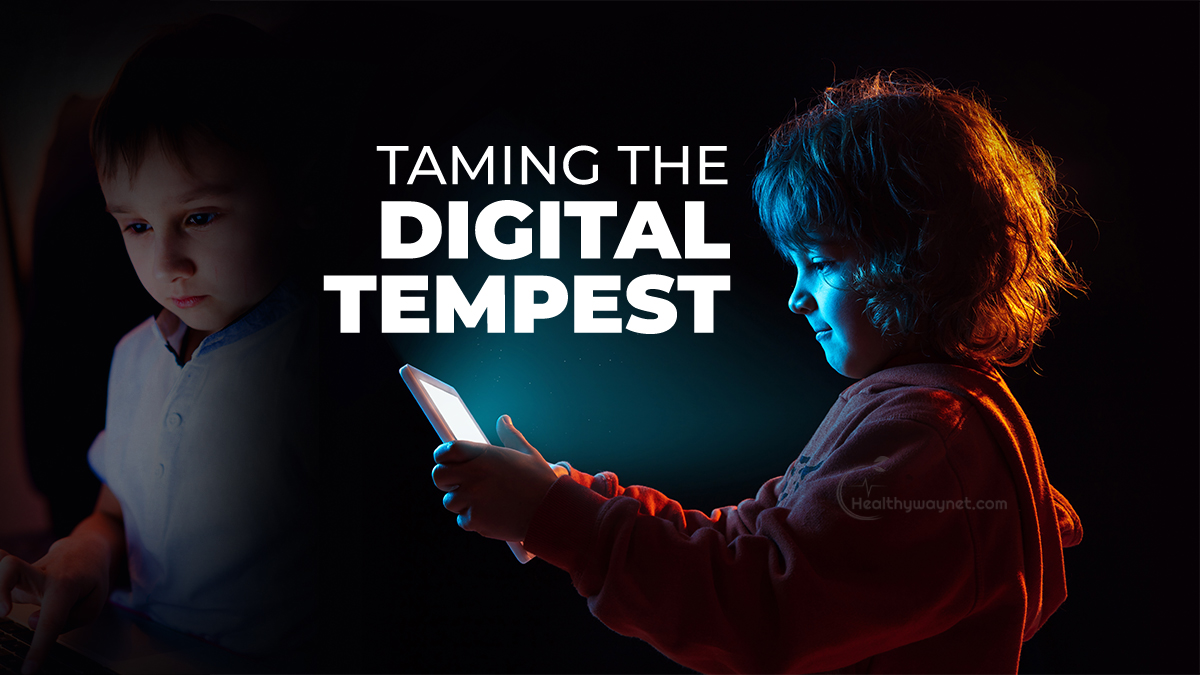In this age of information technology, electronic screens have become a part of our lives. From smartphones to tablets and televisions, screens surround us. While technology has many advantages,
it also poses a significant challenge, especially when it comes to our kids.
Screen addiction in toddlers is something that today's parents and caregivers should be aware of. In this article, we will delve into what screen addiction is, how it affects toddlers, and how to help your children maintain a healthy relationship with screens.
Understanding Screen Addiction in Toddlers: What Is Screen Addiction?
Screen addiction, or screen time addiction, refers to an excessive and compulsive use of digital devices. This term is used when someone (in this case a toddler) spends an unhealthy amount of time in front of screens, often compromising many important aspects of life.
Why Are Toddlers at Risk?
Parents often rely on smartphones and tablets to soothe a fussy toddler or have a moment of peace for themselves. However, the appealing nature of these devices can lead to excessive screen time, which can hinder a toddler's development.
Toddlers are particularly vulnerable to screen addiction due to their developmental stage. Their brains are rapidly growing and forming. They sense the world around them with utter curiosity and wonderment. This very nature of theirs is what makes them run into trouble with the digital screens. The enhanced and rapidly changing visual and auditory signals these gadgets emit can get an impressionable toddler hooked in no time.
The Impact of Screen Addiction on Toddlers
When toddlers spend time on digital screens excessively, it has the potential to affect their development in many ways.
Cognitive Development
Excessive screen time can hinder a toddler's cognitive development. It limits their opportunities for learning by trial- and- error, problem-solving, and creative play, which are vital for cognitive growth.
Language Development
Language skills are developed through human interaction. Excessive screen time can limit a toddler's exposure to spoken language, leading to language delays.
Social Skills
Toddlers learn social skills by interacting with adults, siblings and peers. Too much screen time can result in limited social interactions, hindering the development of these vital skills.
Physical Health
When toddlers spend a lot of time on digital devices, they don't get as much exercise as they would otherwise spending time outdoors, walking, running, jumping, climbing trees, or playing with peers.
This can cause obesity and affect the growth of their muscles and bones, as well as the overall health of their hearts and lungs.
Sleep Disruptions
Screen time before bedtime can interfere with a toddler's sleep patterns, leading to restless nights and daytime fatigue.
Recognizing Signs of Screen Addiction
So, how can you know whether your little one is getting addicted to screens? Look for the following
tell-tale signs your toddler might be showing.
Increased Agitation
If your toddler becomes irritable or irritated when screen time is limited or taken away, it may be a sign
of addiction.
Neglected Activities Of Daily Living
If your child neglects essential activities like eating, sleeping, and personal hygiene due to excessive screen time, it's a reason for concern.
Social Isolation
Toddlers with screen addiction may isolate themselves from social interactions with peers and family.
Decline in Educational Performance
For older toddlers in preschool or early childhood education, a decline in school performance may be an indicator of screen addiction.
Difficulty in Self-Regulation
Toddlers may struggle with self-regulation, unable to control their impulses when it comes to screens.
Preventing and Managing Screen Addiction
Every problem has a solution, it's just a matter of finding it out and acting on it. Screen addiction among toddlers is no exception. There are things parents and caregivers can do to prevent it and let their toddlers have a healthy relationship with digital screens, not compromising their development while getting the benefits those devices can offer.
Setting Healthy Screen Time Limits
Establish clear guidelines for screen time. The American Academy of Pediatrics recommends no screen time for children under 18 months and a maximum of one hour per day for children aged 2 to 5.
Quality Over Quantity
Focus on the quality of content your child is exposed to on those digital devices. Choose educational and age-appropriate programs and apps that promote learning.
Be a Role Model
Children learn by example. Be mindful of your own screen time habits. Set a positive
example for your toddler.
Create Screen-Free Zones
Designate specific areas in your home as screen-free zones, such as the dining room
and the bedroom.
Engage in Interactive Play
Encourage activities that involve physical, social, and imaginative play. These activities
foster healthy development.
Family Time
Allocate time for family activities and interactions. These moments are invaluable for bonding and creating lasting memories.
Monitor Content
Regularly review and monitor the content your child engages with. Make sure it's age appropriate and provide positive stimulation for your child.
Balance Digital and Real-World Learning
Incorporate technology into your child's learning process but balance it with real-world experiences. Trips to the park, reading physical books, and hands-on activities are just as essential.
Seeking Professional Help
If you suspect that your toddler is struggling with screen addiction, it's important to seek professional help. Child psychologists and pediatricians can provide guidance and support tailored to your child's unique needs.
Conclusion
Screen addiction in toddlers is a real concern in our digital age. However, by understanding the risks, being proactive in managing screen time, and providing a healthy balance between screens and
real-world experiences, parents and caregivers can help their toddlers develop in a well-rounded manner. Remember, toddlers are at a critical stage of development, and the choices made during this time can have a lasting impact. Be mindful, be present, and guide your child toward a healthy relationship with screens. Your efforts today will pave the way for a brighter, more balanced future for your little one.
]]>


-(2).png)
Comments 0
No comments yet
Be the first to share your thoughts!
Leave a Comment